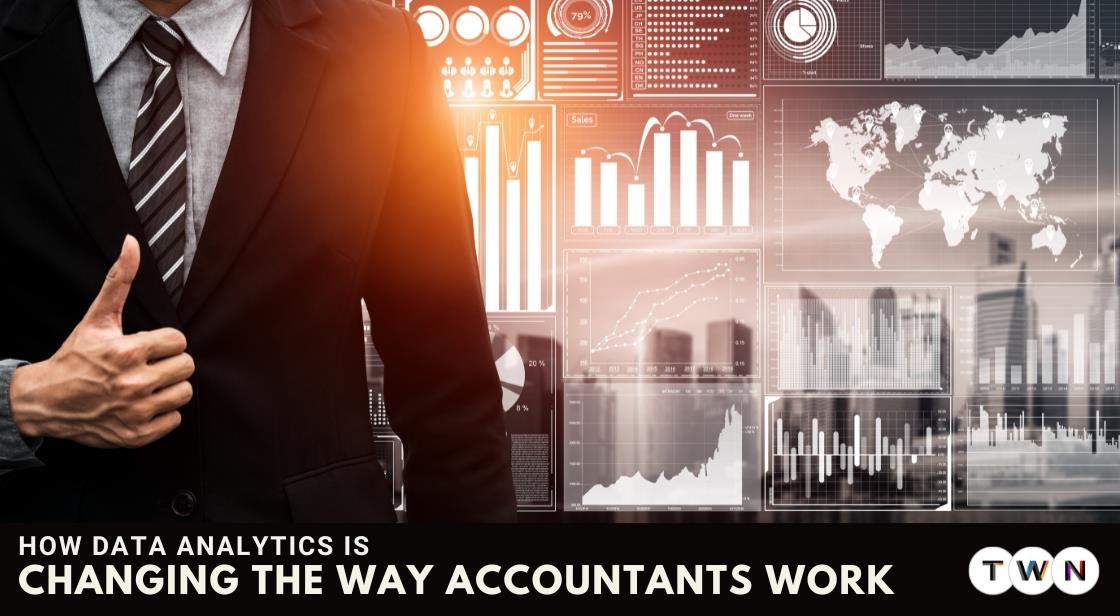How Data Analytics Is Changing the Way Accountants Work

Blog Post
In the ever-evolving landscape of accounting, traditional practices are making way for advanced technologies, and data analytics is at the forefront of this transformation.
Accountants are no longer confined to manual calculations and spreadsheet management; instead, they are embracing data analytics to unlock insights, provide strategic recommendations, and enhance their roles.
This blog post explores the profound ways in which data analytics is reshaping the accounting profession, empowering accountants to offer more effective investment advice, elevate audit quality, navigate time constraints, ensure budget accuracy, and adeptly manage business risks.
As the demand for data-driven insights continues to grow, accountants equipped with analytics skills are poised to thrive in the modern accounting ecosystem.
Accounting involves more than just filing taxes and balancing books. The world of technology has evolved in recent years leading to the rise of software that has helped automate many accounting processes that were previously done manually.
This has allowed accounting professionals to assume a more analytical role. If you are an accountant still dealing with the old calculations and spreadsheets, you may want to look deeper into the numbers.
Any accountant that wants to succeed in the modern world needs to know how to use data analytics to discover insights and provide recommendations. If you are ready to catapult your accounting career, this blog post is for you. We look at the different ways data analytics is changing how accountants work.
How Data Analytics Is Changing the Way Accountants Work
1. More Effective Investment Advice
Every industry has a set of underlying data that you can use to determine the viability of an investment opportunity. As an accountant, you can adopt a strong predictive model to help analyze variables that can impact an investment.
This includes things such as market mood, regulatory environment, and financial risks. Tax accountants can use data analytics to correctly predict market movements and make insightful prescriptions. This can help your clients save money on taxes and venture into more profitable investments.
2. Audit Q uality
Accountants have to deal with large volumes of data and missing any slight details could have adverse outcomes. By pursuing statistic degrees and leveraging the strength of analytics tools, you gain the capability to effectively inspect large volumes of data. You can analyze entire financial records instead of working with small sample sizes. This makes it easier to identify outliers, reducing the margin for error and improving the reliability of recommendations you make.
3. Time Constraints
You may have to deliver vital data on short notice which may not always be possible if you have to deal with lots of data. With better data analytics skills, you can speed up the process and crunch data on demand to prepare financial statements.
They can summarize business transactions into profit and loss and other similar reports. You may have a specific interval for preparing these statements, but they tend to lose relevance for investors if they have to wait.
4. Budget Accuracy
Many projects have failed or stalled because businesses failed to correctly estimate how much it would cost to get it done. Using accounting and analytics tools allows you to crunch existing data to make more accurate and relevant budgets based on the market conditions and potential changes. Real time data analysis also makes it possible to revise budgets whenever something needs to change ensuring that your projects go as planned.
Alos Read : How to Conduct a Market Analysis to Grow Your Business?
5. Managing Business Risks
You can never run from the fact that business is all about taking risks. However, success in this field depends largely on how effectively you can anticipate and manage risks.
You need to be able to predict risks such as fraud, bankruptcy, and misstatements in financial reports. You can take advantage of predictive analytics to determine risk areas and gauge potential of specific risks occurring. It can also help you come up with effective preemptive remediation steps.
Endnote
Data is of little to no use on its own. Data analytics, however, can help you categorize large data sets and spot relationships between complex data points or easier trend analysis and reporting. It has had a huge impact in the world of accounting and remains a valuable tool for accountants who want to become better at what they do.
You May Like
EDITOR’S CHOICE












